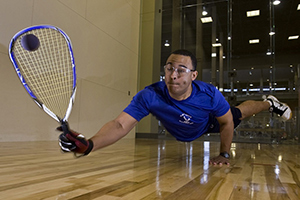Racquetball looks like a simple sport, and it is. Anybody can play racquetball, either with a partner or alone. Very little equipment is needed, just a racquetball racket, a ball, a glove and some safety eye wear. Find a court and you’re ready to play!
There is a little more to racquetball than this, however. Besides simplicity of play and equipment, racquetball’s super benefits to body and mind cannot be overlooked.
Racquetball improves balance and flexibility.
 Good balance is a much more important ability than we may think. Falls are a leading cause of death and severe injury in the home. Football is not the most common cause of traumatic brain injury, falls are. Racquetball promotes balance and coordination. Chasing a ball is the incentive, and the body is forced to stretch and turn, adjusting itself to the balance needed. At first, racquetball is a stretch all around, leaving a person breathless or stumbling. Through practice, movements become fast and flexible.
Good balance is a much more important ability than we may think. Falls are a leading cause of death and severe injury in the home. Football is not the most common cause of traumatic brain injury, falls are. Racquetball promotes balance and coordination. Chasing a ball is the incentive, and the body is forced to stretch and turn, adjusting itself to the balance needed. At first, racquetball is a stretch all around, leaving a person breathless or stumbling. Through practice, movements become fast and flexible.
Racquetball Improves mental agility and hand-eye coordination.
Racquetball teaches you to think on your feet – fast! Quick, strategic decisions are the name of the game. Of course, someone misses the ball. But eventually, neurons between muscle and brain adapt, improving reflexes for hand-eye coordination and vision. This translates into better adaptability and performance off the court, as well.
Racquetball burns fat.
In one hour of play a person can race more than two miles around a court, and burn between 600-800 calories. This is hard to duplicate on a treadmill. Regular racquetball will keep you at a healthy body weight and fat deposits will burn up. The best part of the scenario is that a person is so busy strategizing and chasing the ball that the real effort to lose fat becomes secondary.
The game strengthens bones as well as muscles.
The women in the video look thin and muscular, but they are also creating bone mass to sustain them later in life. Osteoporosis is a cruel disease marked by frequent fractures and terrible back pain. Bones are as thick as they will get around the age of 30. After that, bone mass begins to decline. Woman over 50 are most at risk, because women have a smaller bone structure than do men. This is why a game like racquetball, a weight-bearing exercise, can slow bone loss and maintain the muscle mass that promotes bone health.
A racquetball game is a social event!
Once you dare to play against an opponent or partner up on a doubles team, your racquetball society grows. Soon you will always have someone ready to get up a game. If not, practice is easily done on your own. Besides, if you just hit the ball around for awhile, a partner may appear!
The social component and exercise of racquetball increase endorphins, which are feel-good chemicals produced by the brain. This is vital for those under stress or feeling depressed and anxious.
The intense movement of the game forces focus on the ball and the opponent and nothing else, which is what anyone would like to do with stress and worry!
